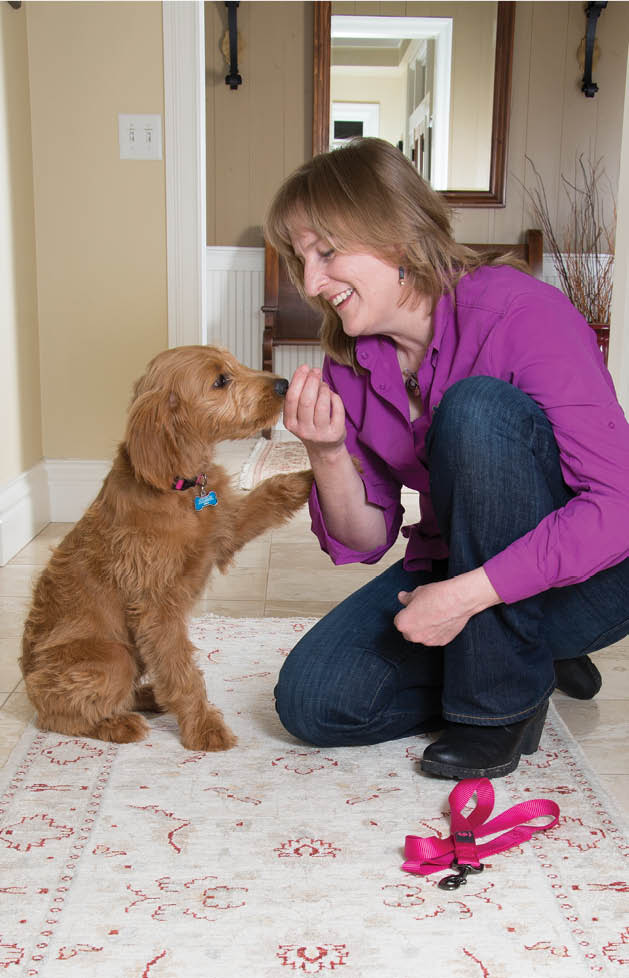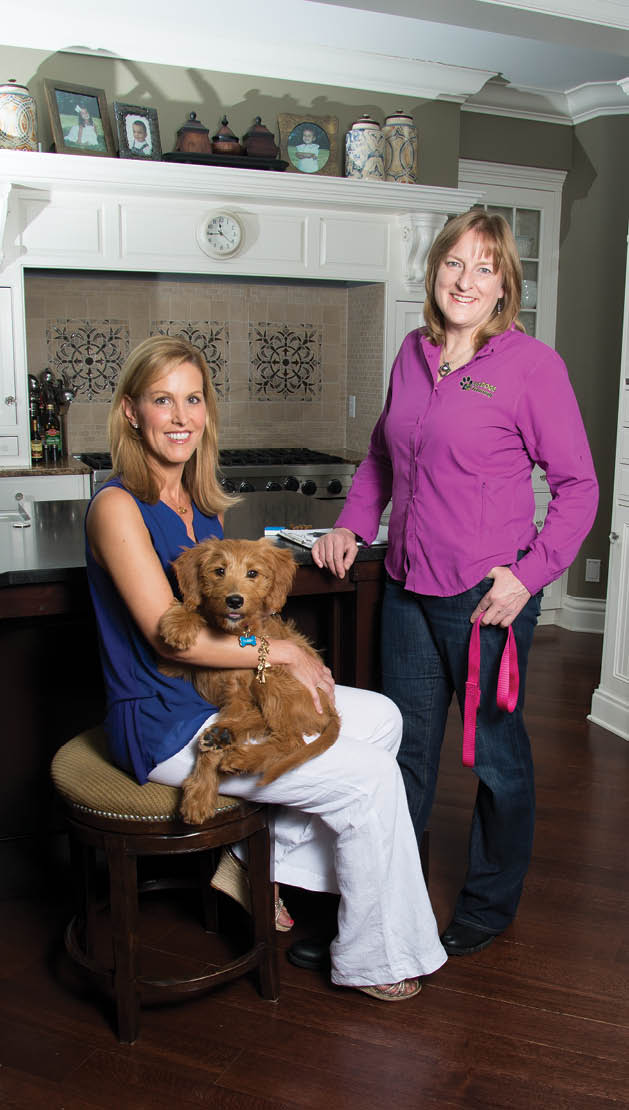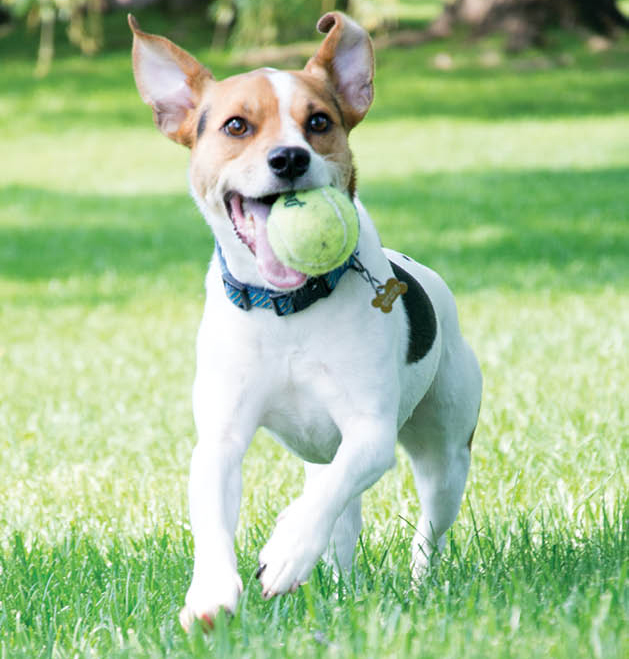Gordon, my one-year-old golden retriever, acts like you’d expect a one-year-old golden retriever to act. He’s affectionate and excitable, a combination that can cause problems if you don’t like 60-pound dogs in your lap.
My wife and I got Gordon from a reputable breeder. With Gordon, our biggest problem is that he gets worked up and barks when he wants something. It’s annoying, but I never really noticed how bad he had gotten until I brought him to meet with Susan Ward, owner of PupDogs Training in Minnetonka.
Ward specializes in dogs with behavior issues and focuses on positive reinforcement rather than punishing dogs for bad behavior. Some old-fashioned training styles, like using choke chains, shock collars and punishment, might be effective, but only because those methods make the dogs live in fear of being punished.
To make sure positive reinforcement is effective, Ward works with owners as much as she works with dogs. “I train owners, not dogs,” she says.
An animal looks to his or her owner for guidance. That makes an owner’s behavior as (or more) important than an animal’s behavior. An owner must spend as much time as possible learning their dog’s body language and understanding their dog’s needs, which makes them able to help the dog become well-trained and polite.
Gordon and I spent about an hour with Ward, and while he certainly isn’t cured of “the barks,” even after an hour I saw the importance of top-notch training.
“I love being able to help a family turn their dog around and be able to help their dog live to a ripe old age,” Ward says.
♥ In-Home Training
One technique Ward uses is in-home training. It can be a valuable asset to help dogs learn in their own environment. Another local trainer, Kathryn Newman, who owns Augusta Dog Training and Doggy Daycare in Wayzata, works extensively with in-home training.
“Every dog is different, and the most important thing is to identify the proper root cause of behavior problems,” Newman says. “Many dogs have been misdiagnosed, so then you have to work to figure out the correct diagnosis.”
Newman compares young dogs (in particular dogs under 2 years old) to having a toddler. Some of the keys are keeping them busy and supervising them when they are playing. Buying puzzle toys to help dogs use their brains and redirecting them to a proper toy when they are misbehaving are some of the simplest things dog owners can do.
When your dog has bigger behavior issues, in-home training can allow the trainer to tailor their work to a specific dog’s needs. Newman works with dogs from the time they are puppies to when they are adults. Like Ward, one of the most important parts for Newman is not only meeting the dog and finding out what behaviors need to be addressed, but sitting down with its owners to find out their concerns, and teaching them how to best work with their pet.
“You need to build a strong, functional leader/follower relationship,” Newman says. “If the dog is able to look to you as a leader, they will be more responsive to the training we provide.”


(Owner Kelli Bhojwani with her goldendoodle puppy, Cubby, complete their training sessions with Susan Ward at Bhojwani’s home.)
♥ Group Classes
Before trying more intensive training methods, most owners will enroll their dog in group classes. This can be an important first step to helping socialize your dog.
“Many behavioral issues can be traced to anxiety,” Ward says. “Socializing your dog is an important step to helping your dog overcome anxiety.”
The best place to start socializing your pet is in a puppy class. In these classes, dogs learn the most basic training commands, but more importantly, learn how to interact with other dogs in an appropriate way.
While much of the work Ward does is in-home, she also offers group classes at Pet Stuff in Minnetonka. For many dogs, classes like this are all the training they need, and once they graduate, will be well-adjusted members of the dog community.
♥ Board and Train
When group training isn’t enough and you don’t have time to do in-home training, board and train programs offer another option.
Heather Hime started Lucky Paws in 2010. While she offers an in-home training option, she also offers boarding programs and boot camps to help dogs learn better behavior. “The more interested [people] are, the more likely they will be successful in group classes or in-home training,” says Hime. “If they prefer to have their dog trained without learning all that goes into it, they can bring their dog to our facility.”
Hime’s boot camps can be done both at her boarding facility in East Bethel, and in-home. Kathy Newman (no relation to Augusta owner Kathryn Newman) contacted Hime about her dog Lily about two years ago.
Lily is a rescue dog that came from a hoarding household in Oklahoma. When Newman adopted her from a rescue shelter, Lily was shy and had spent time in a special program for dogs that suffer from social anxiety.
“I would’ve had to give Lily back if I hadn’t gotten Heather’s help,” Newman says. Hime spent two months working with Lily through her boot camp training, acclimating her to a new environment and helping her become more confident. Hime and Newman then worked to socialize Lily.
They trained Lily in all the basic obedience skills, but also showed her how to be more comfortable with social cues. They would place Post-it notes on different objects, and when she touched those objects, she would get a treat. Newman will occasionally contact Hime with questions, but Lily’s official training is done. Newman says Lily has gone from being a shy dog to being the dog any owner would want.
“She never used to come to me when I came home. Most dogs are excited when their owner comes home and I never got that. Now she is excited to see me.”

(Dexter: The beagle-terrier mix, who attended Pup Dogs in Minnetonka, takes a break from group training.)
Find more information:
Pupdogs
susan@pupdogs.com
952.913.3170
Lucky Paws
heather@ luckypawsmn.com
612.388.9656
Augusta Dog training
augustawayzata@aol.com
952.476.2023








